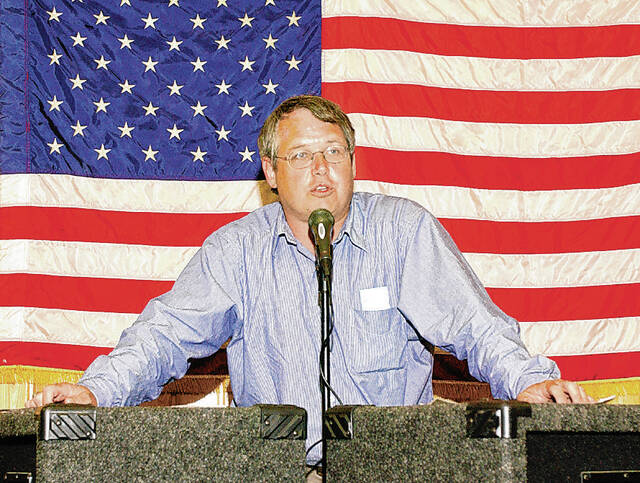A central figure in the Greenwood community for more than a decade-and-a-half died from cancer last week.
Bruce Armstrong, 64, died on Dec. 1 — a day before his 65th birthday — after a years-long battle with cancer.
Armstrong served for 16 years on the Greenwood City Council, from 2004 to 2019, and ran for state representative last year.
An Anderson-native, he graduated from Decatur Central High School in 1975, and went on to get a bachelor’s degree in industrial engineering and graduate from the General Motors Institute of Technology — now known as Kettering University — in Flint, Michigan in 1980. He earned a master’s degree in mathematics from the University of Waterloo in Ontario in 1983.
An employee of General Motors for 30 years, Armstrong retired in 2010, before returning to work four months later at Fauercia, an automotive supply company. He retired from Fauercia last year.
While working at General Motors, Armstrong made his political ambitions known. He first ran for city council in 2003, ousting incumbent Jeff Colvin in the primary, and beating democrat Lani Cummings in the November general election. The win began Armstrong’s 16-year stint as representative for District 3.
Armstrong ran because he opposed former Greenwood Mayor Charles Henderson’s plans for a new city building. Armstrong successfully organized residents to sign petitions against the project, which ultimately failed. He ran on a platform of supporting right-sized government and better-quality housing in the city.
At the time, he said he worked as an outsider to defeat the mayor’s political machine during the petition drive. Armstrong attributed his primary victory to his work pounding pavement to reach voters and his stance on growth.
“We need diversity in housing types to keep the tax base up, and diversity in industry to keep the wage base up. That issue won the election,” Armstrong told the Daily Journal in May 2003.
He pushed for more upscale housing in the city and less warehouses. In 2019, he said Greenwood had been overbuilt with starter homes and warehouses.
Throughout his 16 years on the council, Armstrong became known for his often lone “no” vote, especially when it came to rezoning large swaths of land, approving tax breaks for competing businesses and speculative buildings. While he supported tax abatements for some businesses, he did not support it for those which couldn’t provide details about the types of jobs, pay and benefits that would be associated with it, nor those which would compete with other similar Greenwood businesses, he said in 2019.
“He stood for what he thought was right. Sometimes that meant he stood alone; sometimes that created some conflict, but that was Bruce. He was willing to do what he thought was the right thing,” said Mike Campbell, a city council member.
Armstrong was the first councilman to become president in 2012, when Greenwood became a second-class city. Prior to 2012, the mayor ran city council meetings. Armstrong was president for one year, Campbell said.
Prior to the city becoming a second-class city, Armstrong said he was against the move because it would mean bigger government, less accountability and a higher cost for taxpayers. After the move became official, council member Ron Bates nominated Armstrong to serve as president, according to Daily Journal archives.
Armstrong also pushed relentlessly for responsible spending within the city’s tax increment financing (TIF) districts, more police officers and another fire station in southeast Greenwood.
“Due to an increase in train traffic, we need another fire station on the east side of railroad tracks. Right now, if something happens and there’s a train going through, that area can only be serviced out of the northeast firehouse,” Armstrong told the Daily Journal in April 2019.
Armstrong was also leery of Mayor Mark Myers’ plans for downtown Greenwood, specifically the site of the former middle school property, now dubbed The Madison. He criticized the plan as something you would see on the northside of Indianapolis rather than Greenwood.
He lost re-election in 2019, when he was defeated by council member Michael Williams. After his municipal election loss, he announced he would be running to replace former state Rep. Woody Burton in 2020, after Burton announced his retirement. He ran because he thought an experienced politician such as himself should replace Burton.
“After 16 years in city council, it was time to move up to the next level to handle issues that cannot be handled at the city level,” Armstrong told the Daily Journal in May 2020.
Economic development and TIF district reform would have been his top priorities if he was elected. But he lost to Rep. Michelle Davis, R-Whiteland, in the primary election.
Though Campbell knew Armstrong had cancer, he was surprised to hear he wasn’t doing well late last month. A few years ago, Armstrong had said he was doing well, Campbell said.
At the start of Monday’s city council meeting, they had a moment of silence to honor Armstrong.
He was a dedicated council member who always did what he thought was best for the city of Greenwood. The city is appreciative of the time he spent serving residents, and his family will continue to be in Mayor Mark Myers’ thoughts and prayers, Myers said.
“(Armstrong) was very passionate about the things that went on in the city,” Myers said. “Even though we didn’t always agree on everything, we got along quite well and he will be missed.”
Armstrong is survived by his wife, Susan, and sons, Ryan and Nicholas.





